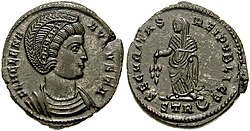Helena of Constantinople
| St. Helena | |
|---|---|

Coin of Flavia Iulia Helena, mother of Constantine I. Æ Follis (19mm, 3.45 gm). Treveri (Trier) mint. Struck 325–326 AD.
|
|
| Empress; Mother of Constantine the Great | |
| Born | c. 246/50 possibly at Helenopolis Bithynia, Asia Minor |
| Died | c. 327/30 Rome |
| Venerated in | |
| Canonized | Pre-Congregation |
| Major shrine | The shrine to St. Helena in St. Peter's Basilica |
| Feast | 18 August (Roman Catholic Church); 21 May (Orthodox, Anglican, and most Lutheran Churches); 19 May (some Lutheran Churches); 9 Pashons (Coptic Orthodox Church) |
| Attributes | Cross |
| Patronage | archaeologists, converts, difficult marriages, divorced people, empresses, Saint Helena island, new discoveries |
Helena, St. Helena, or St. Helen (Greek: Αγία Ελένη, Latin: Flavia Iulia Helena Augusta; c. 250 – c. 330), was a Greek native from the Greek city of Drepana (Δρέπανα) in the province of Bithynia in Asia Minor. She became the of the future Roman Emperor Constantius Chlorus (reigned 293-306) and the mother of the future Emperor Constantine the Great (reigned 306-337). She ranks as an important figure in the history of Christianity and of the world due to her major influence on her son. Tradition credits her with a pilgrimage to Syria Palaestina, particularly to Jerusalem, during which she allegedly discovered the True Cross. Pious beliefs also associate her to the foundation of the Vatican Gardens.
The Eastern Orthodox Church, Oriental Orthodox Church, Roman Catholic Church, and the Anglican Communion revere her as a saint; the Lutheran Church commemorates her.
Helena's birthplace is not known with certainty. The 6th-century historian Procopius is the earliest authority for the statement that Helena was a native of Drepanum, in the province of Bithynia in Asia Minor. Her son Constantine renamed the city "Helenopolis" after her death around 330, which supports the belief that the city was her birthplace. The Byzantinist Cyril Mango has argued that Helenopolis was refounded to strengthen the communication network around his new capital in Constantinople, and was renamed simply to honor Helena, not to mark her birthplace. There was also a Helenopolis in Palestine and a Helenopolis in Lydia. These cities, and the province of Helenopontus in the Diocese of Pontus, were probably both named after Constantine's mother.
...
Wikipedia
